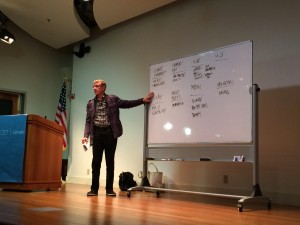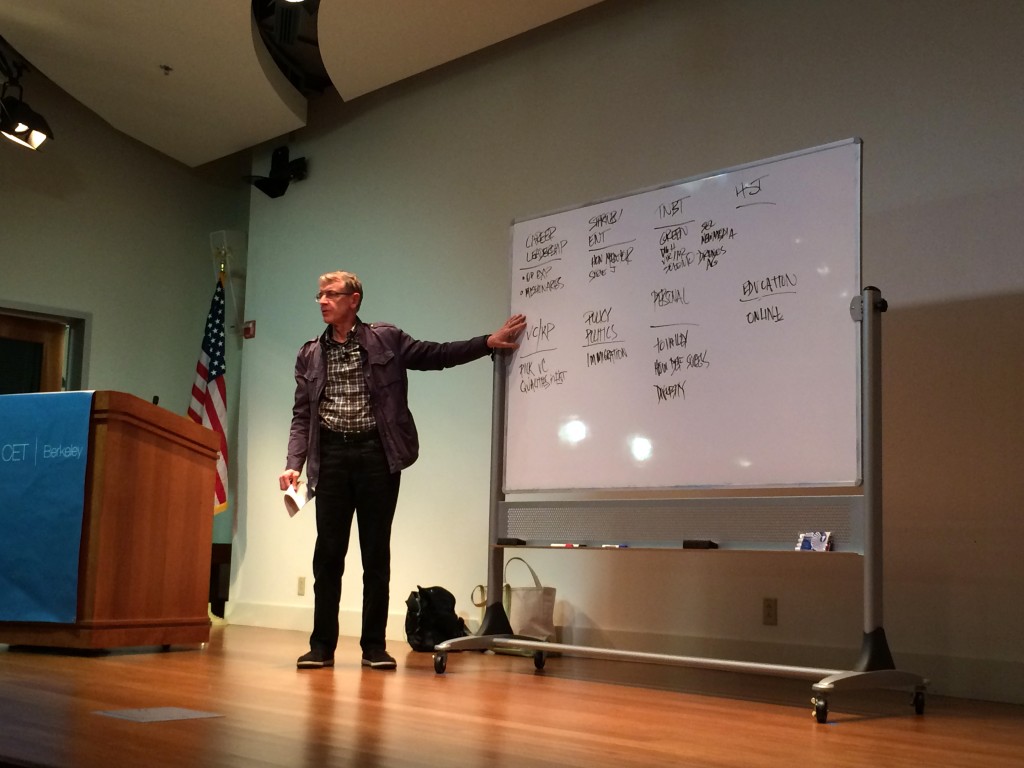The Banatao Auditorium at UC Berkeley was crowded on Tuesday, Feb. 24. Students from diverse programs had occupied all the seats and even remained standing in order to listen to the Newton Distinguished Innovator Lecturer, John Doerr.
Doerr, a partner in venture capital firm Kleiner Perkins Caufield & Byers (KPCB), has been backing successful entrepreneurs — such as Google’s Larry Page, Sergey Brin, Eric Schmidt and Amazon’s Jeff Bezos — for more than three decades. He offered a very interactive talk, managing to keep the students engaged for the entire event. The avid audience had the opportunity to ask numerous questions, guiding the lecture with their own interests and concerns in mind.
The questions, which the speaker wrote down on a whiteboard, ranged from how to recognize “The Next Big Thing” (TNBT), to the situation of women in the tech world and the importance of networking and searching for inspiration.
When asked about tips and personal advice about problem solving, Doerr said that he uses books for inspiration. “I love books; books are my friends,” he said. In particular, he mentioned The Monk and the Riddle, by Randy Komisar, which reflects the importance of having a coach when embracing a new venture.
Doerr, who has been turning his focus toward green technologies, said during the talk that green is not a sector, but a spectrum, which “remains an enormous opportunity.” Although he recognizes the severity of global warming and the need to “change the carbon equation,” Doerr said he believes we have the technology to solve the problem of carbon emission.
The speaker also mentioned the flaw in the American education system, especially in elementary school, and the problem of a health system that is too expensive for the country.
According to Doerr, there are a few essential ways of recognizing TNBT– in other words, the next Google. Technical people, outstanding management, a change of focus, execution and reasonable finance are the main elements to recognize it. Commitment and being honest about what the risks are also important, he added.
However, Doerr said he is now able to recognize TNBT or the person who is going to do it, by only looking at the intensity of their eyes, or even the way they laugh. “When you meet Jeff Bezos, you know that you want to be in trouble with them,” Doerr said. The key is to make mistakes, but always “new mistakes.”
Doerr also pointed out the importance of networking — the “real” networking face-to-face, he said — and share with the students some of his best practices in the venture world: build a network of advisors, hang around universities and “read like crazy.”
Other pieces of advice were to learn and grow, learn how to sell and to lead a team, and getting out of the comfort zone when networking. He also advised the students to choose a field they are passionate about and to live in a culture that inspires them.
In this regard, Doerr compared what he called “Mercenaries” vs. the “Missionaries”: the mercenaries are those who are driven by paranoia, who are opportunistic and care about “the pitch,” while the missionaries are those who are driven by passion, who focus on the strategy and on the big idea. Among other differences, the mercenaries care about success, while the missionaries not only want to succeed but they want that success to have significance.
When a woman in the audience asked Doerr about the situation of women in the tech world, Doerr responded that it is a problem and that “we’re finally starting to talk about it.” “I hope you do something about it; I hope we can solve this fast,” he said.
Finally, the speaker advised the students to try to get a job in the field they like, the same he did when he first came to Silicon Valley- he first worked at Intel.
Doerr left the door opened to those students who would like to approach him. He also reminded them that he is always open for the best ideas and that KPCB is always ready for proposals that “blow our minds.”
The Banatao Auditorium at UC Berkeley was crowded on Tuesday, Feb. 24. Students from diverse programs had occupied all the seats and even remained standing in order to listen to the Newton Distinguished Innovator Lecturer, John Doerr.
Doerr, a partner in venture capital firm Kleiner Perkins Caufield & Byers (KPCB), has been backing successful entrepreneurs — such as Google’s Larry Page, Sergey Brin, Eric Schmidt and Amazon’s Jeff Bezos — for more than three decades. He offered a very interactive talk, managing to keep the students engaged for the entire event. The avid audience had the opportunity to ask numerous questions, guiding the lecture with their own interests and concerns in mind.
The questions, which the speaker wrote down on a whiteboard, ranged from how to recognize “The Next Big Thing” (TNBT), to the situation of women in the tech world and the importance of networking and searching for inspiration.
When asked about tips and personal advice about problem solving, Doerr said that he uses books for inspiration. “I love books; books are my friends,” he said. In particular, he mentioned The Monk and the Riddle, by Randy Komisar, which reflects the importance of having a coach when embracing a new venture.
Doerr, who has been turning his focus toward green technologies, said during the talk that green is not a sector, but a spectrum, which “remains an enormous opportunity.” Although he recognizes the severity of global warming and the need to “change the carbon equation,” Doerr said he believes we have the technology to solve the problem of carbon emission.
The speaker also mentioned the flaw in the American education system, especially in elementary school, and the problem of a health system that is too expensive for the country.
According to Doerr, there are a few essential ways of recognizing TNBT– in other words, the next Google. Technical people, outstanding management, a change of focus, execution and reasonable finance are the main elements to recognize it. Commitment and being honest about what the risks are also important, he added.
However, Doerr said he is now able to recognize TNBT or the person who is going to do it, by only looking at the intensity of their eyes, or even the way they laugh. “When you meet Jeff Bezos, you know that you want to be in trouble with them,” Doerr said. The key is to make mistakes, but always “new mistakes.”
Doerr also pointed out the importance of networking — the “real” networking face-to-face, he said — and share with the students some of his best practices in the venture world: build a network of advisors, hang around universities and “read like crazy.”
Other pieces of advice were to learn and grow, learn how to sell and to lead a team, and getting out of the comfort zone when networking. He also advised the students to choose a field they are passionate about and to live in a culture that inspires them.
In this regard, Doerr compared what he called “Mercenaries” vs. the “Missionaries”: the mercenaries are those who are driven by paranoia, who are opportunistic and care about “the pitch,” while the missionaries are those who are driven by passion, who focus on the strategy and on the big idea. Among other differences, the mercenaries care about success, while the missionaries not only want to succeed but they want that success to have significance.
When a woman in the audience asked Doerr about the situation of women in the tech world, Doerr responded that it is a problem and that “we’re finally starting to talk about it.” “I hope you do something about it; I hope we can solve this fast,” he said.
Finally, the speaker advised the students to try to get a job in the field they like, the same he did when he first came to Silicon Valley- he first worked at Intel.
Doerr left the door opened to those students who would like to approach him. He also reminded them that he is always open for the best ideas and that KPCB is always ready for proposals that “blow our minds.”


